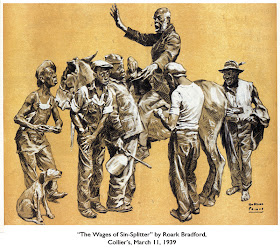(1893-1951)
By today’s standards the following
illustration would be considered politically incorrect and perpetuate African
American stereotype. This of course would be true.
However, it is important when encountering art of any type (literature,
theater….) to take into account the tenor of the times in which it was created
rather than sending it to the proverbial museum basement.
There are three separate ways of analyzing a work of art: from the
historical context, the aesthetic and the pseudo-psycho analytical stand point.
(Thanks to Freud and the Surrealists delving into the mind)
These three different ways of looking at art change depending on what’s
popular at the present time with art critics and historians.
With that caveat out of the way, let’s look at this from the aesthetic
point of view. This appears to be charcoal
on toned paper (for the half-tones) with white gouache for the highlights.
In the master’s hands, this is an effective
and simplified method of creating a drawing that reads well on the page. All
you need is a charcoal stick and a little white, the paper takes care of the
rest.
This composition is enhanced by the animated gestural qualities of both the
figures and the application of the flowing line quality. And the chosen
highlighted areas nicely balance out the tonal areas of paper and the charcoal.
This is fantastic drawing from
the aesthetic point of view and is a
benchmark of how far we have come from an historical perspective.
Thanks to Today’s Inspiration
and guest author Tony Gleeson
for the illustration and information on this forgotten artist

No comments:
Post a Comment